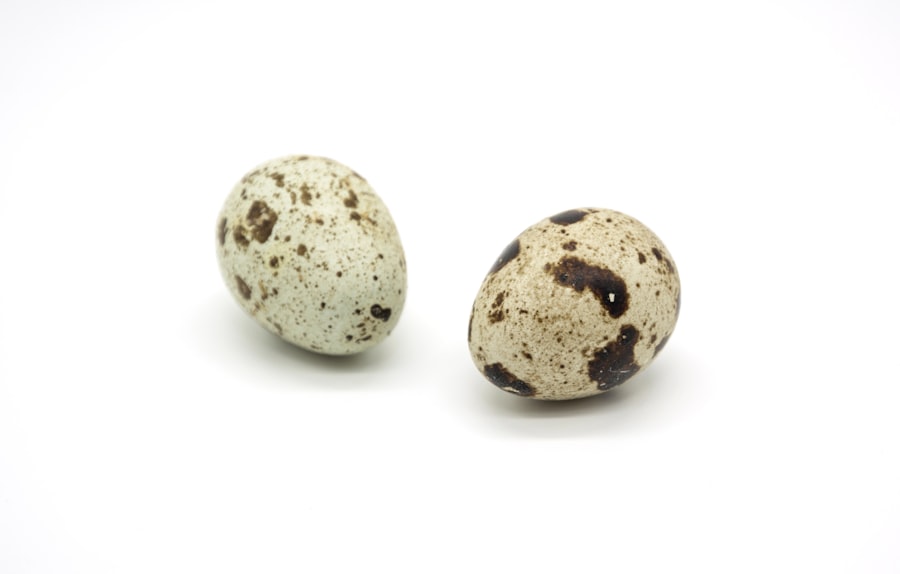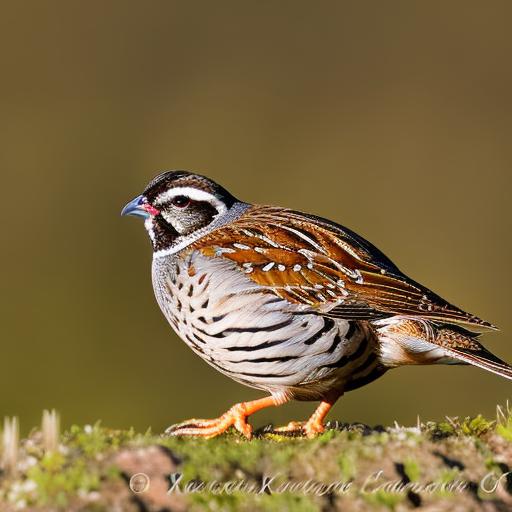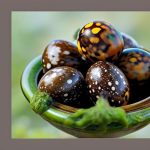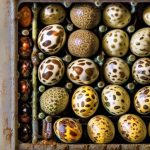Quails are small, ground-dwelling birds that are known for their social behavior and strong flocking instincts. They are highly active during the day, foraging for food and engaging in social interactions with other members of their group. Quails are also known for their ability to fly short distances, but they prefer to spend most of their time on the ground, where they can easily access food and shelter. In the wild, quails are known to form strong pair bonds and will often mate for life. They are also highly territorial and will defend their nesting sites and feeding areas from other quails and potential predators.
Understanding the natural behavior of quails is essential for providing them with a suitable environment in captivity. Quails require ample space to move around and forage, as well as access to suitable nesting sites and shelter. They are also highly social birds and thrive in the company of other quails, so it is important to keep them in groups rather than solitary confinement. Additionally, quails are ground-dwelling birds and prefer to have access to a variety of substrates, such as sand, soil, or grass, where they can dust bathe and forage for insects and seeds. By understanding the natural behavior and needs of quails, you can create a suitable environment that promotes their physical and psychological well-being.
Quails also have specific nutritional needs that must be met in order for them to thrive. In the wild, quails are omnivorous and will consume a wide variety of foods, including seeds, insects, and small plants. In captivity, it is important to provide quails with a balanced diet that meets their nutritional requirements. This can include a commercial game bird feed that is specifically formulated for quails, as well as access to fresh greens, fruits, and vegetables. Additionally, providing access to grit and calcium supplements is essential for quails, as these help with digestion and eggshell formation. By understanding the nutritional needs of quails and providing them with a balanced diet, you can ensure that they remain healthy and active.
Key Takeaways
- Quail are social birds that require space to roam and dust bathe, and they prefer to be in groups.
- A balanced diet for quail includes a mix of seeds, grains, and insects, along with access to clean water.
- Quail need a safe and secure environment with proper ventilation, temperature control, and protection from predators.
- Stress in quail can be managed by providing a quiet and calm environment, minimizing disturbances, and handling them gently.
- A regular lighting schedule with 14-16 hours of light per day is essential for quail to maintain their reproductive health and egg production.
- Proper egg collection and handling practices, including regular cleaning and storage in a cool, dry place, are crucial for maintaining egg quality.
- Regular health checks, vaccination, and proper sanitation are important for preventing diseases in quail.
Providing Proper Nutrition and Diet
Quails have specific nutritional needs that must be met in order for them to thrive. In the wild, quails are omnivorous and will consume a wide variety of foods, including seeds, insects, and small plants. In captivity, it is important to provide quails with a balanced diet that meets their nutritional requirements. This can include a commercial game bird feed that is specifically formulated for quails, as well as access to fresh greens, fruits, and vegetables. Additionally, providing access to grit and calcium supplements is essential for quails, as these help with digestion and eggshell formation.
It is important to monitor the dietary intake of quails to ensure that they are receiving the proper nutrients. Overfeeding or underfeeding can lead to health issues and decreased egg production in laying hens. Providing a balanced diet that meets the nutritional needs of quails is essential for their overall health and well-being. Additionally, it is important to provide access to clean, fresh water at all times, as dehydration can lead to serious health issues in quails. By providing proper nutrition and diet, you can ensure that your quails remain healthy and active.
Creating the Right Environment for Quail
Creating the right environment for quails is essential for their overall health and well-being. Quails require ample space to move around and forage, as well as access to suitable nesting sites and shelter. They are also highly social birds and thrive in the company of other quails, so it is important to keep them in groups rather than solitary confinement. Additionally, quails are ground-dwelling birds and prefer to have access to a variety of substrates, such as sand, soil, or grass, where they can dust bathe and forage for insects and seeds.
It is important to provide suitable housing for quails that protects them from predators and the elements. This can include a secure coop or aviary with proper ventilation and protection from extreme temperatures. Providing suitable nesting boxes or areas where quails can lay their eggs is also essential for their reproductive health. Additionally, it is important to provide suitable perches or platforms where quails can roost and rest comfortably. By creating the right environment for quails, you can ensure that they remain healthy and active.
Monitoring and Managing Stress Levels
Quails are sensitive birds that can easily become stressed in response to changes in their environment or routine. Stress can have a negative impact on the health and well-being of quails, leading to decreased egg production, poor growth rates, and increased susceptibility to disease. It is important to monitor the behavior of quails regularly to identify signs of stress, such as decreased activity, aggression, or feather picking.
Managing stress levels in quails involves providing them with a stable environment and routine. This can include minimizing disturbances in their living space, such as loud noises or sudden movements. Additionally, it is important to provide suitable enrichment activities for quails, such as access to dust baths, perches, or toys that encourage natural behaviors. Providing a stable environment and routine for quails can help reduce stress levels and promote their overall health and well-being.
Implementing a Regular Lighting Schedule
Lighting plays a crucial role in the reproductive health and behavior of quails. In the wild, quails are highly sensitive to changes in daylight length, which triggers their breeding behavior. In captivity, it is important to implement a regular lighting schedule that mimics natural daylight patterns in order to promote healthy egg production and breeding behavior in quails.
Providing 14-16 hours of light per day can help stimulate egg production in laying hens and promote healthy reproductive behavior in breeding pairs. It is important to provide a consistent lighting schedule that includes periods of darkness for resting and sleeping. Additionally, it is important to provide suitable lighting sources that are not too bright or harsh, as this can cause stress in quails. By implementing a regular lighting schedule that mimics natural daylight patterns, you can promote healthy reproductive behavior and egg production in your quail flock.
Collecting and Handling Eggs Properly

Proper egg collection and handling is essential for maintaining the quality and safety of quail eggs. It is important to collect eggs from nesting boxes or areas regularly to prevent them from becoming soiled or damaged. Handling eggs with care is essential for preventing cracks or breakages that can lead to contamination or spoilage.
It is important to clean eggs promptly after collection using a dry cloth or brush to remove any dirt or debris. It is important not to wash eggs with water, as this can remove the protective cuticle and increase the risk of bacterial contamination. Storing eggs in a cool, dry place with proper ventilation can help maintain their quality and freshness. By collecting and handling eggs properly, you can ensure that they remain safe for consumption.
Health and Disease Management for Quail
Maintaining the health of your quail flock is essential for their overall well-being and productivity. It is important to monitor the behavior and appearance of your quails regularly to identify signs of illness or disease. Common signs of illness in quails can include decreased activity, decreased appetite, respiratory issues, or abnormal droppings.
It is important to provide suitable veterinary care for your quail flock in the event of illness or injury. Additionally, it is important to implement biosecurity measures to prevent the spread of disease within your flock. This can include quarantining new birds before introducing them to your existing flock, as well as maintaining a clean living environment with proper ventilation and sanitation practices. By implementing proper health and disease management practices, you can ensure that your quail flock remains healthy and productive.
If you’re looking for tips on how to keep quail laying consistently, you’ll want to check out Poultry Wizard’s article on chicken coop interior ideas. Creating the right environment for your quail can make a big difference in their egg production. From nesting boxes to lighting and ventilation, this article provides valuable insights into optimizing your coop for maximum egg-laying potential.
FAQs
What are some factors that can affect quail laying?
Some factors that can affect quail laying include diet, lighting, temperature, stress, and the age of the quail.
What should be included in a quail’s diet to promote laying?
A quail’s diet should include a high-quality commercial feed that is specifically formulated for laying quail. Additionally, providing access to calcium supplements, such as crushed oyster shells, can help support egg production.
How can lighting affect quail laying?
Lighting plays a crucial role in quail laying. Quail require a certain amount of light each day to stimulate egg production. Providing 14-16 hours of light per day can help encourage consistent laying.
What temperature range is ideal for quail laying?
Quail thrive in temperatures between 60-75 degrees Fahrenheit. Extreme temperatures, either too hot or too cold, can negatively impact quail laying.
How can stress impact quail laying?
Stress can have a significant impact on quail laying. Loud noises, overcrowding, and predator threats can all cause stress in quail, leading to a decrease in egg production.
At what age do quail typically start laying eggs?
Quail typically start laying eggs around 6-8 weeks of age, depending on the breed.
Meet Walter, the feathered-friend fanatic of Florida! Nestled in the sunshine state, Walter struts through life with his feathered companions, clucking his way to happiness. With a coop that’s fancier than a five-star hotel, he’s the Don Juan of the chicken world. When he’s not teaching his hens to do the cha-cha, you’ll find him in a heated debate with his prized rooster, Sir Clucks-a-Lot. Walter’s poultry passion is no yolk; he’s the sunny-side-up guy you never knew you needed in your flock of friends!







